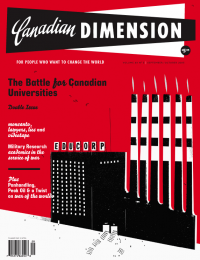Bill 61 is a troubling sign of rising authoritarianism in Québec

Quebec Premier François Legault speaks at a press conference on June 22, 2020. Photo from Twitter.
As Québec’s COVID-19 crisis wanes, the government of François Legault pushed forward with its latest legislative project: Bill 61, An Act to restart Québec’s economy. When read closely, the bill presents several troubling provisions, including the extension of the state of emergency adopted in March 2020 to handle the pandemic. In fact, several of the bill’s provisions appear to be designed to shelter the government from oversight, effectively paving the way for a general lack of accountability.
Though Legault’s Coalition Avenir Québec (CAQ) party presented the legislative amendments with the stated purpose of supporting the province’s post-pandemic economic recovery, Bill 61 quickly drew condemnation from civil rights groups, environmental activists and others who see it as an affront to democratic rights and government transparency. As a brief respite, the amendments were tabled too late in the National Assembly which needed consent from the opposition if they were to be rammed through. With a CAQ majority, however, the passage of Bill 61 could happen as soon as the fall session commences. Now is the time to act.
A closer look at Bill 61
Though Legault’s government has assured Québecers that they intend only to use these new powers to speed up much needed infrastructure projects—such as the construction and renovation of the long-term care residences (CHSLDs) that have been the site of the majority of COVID-19 deaths in the province—there vare valid concerns that this bill would confer a dangerous degree of power and impunity to government officials.
As it stands, Bill 61 contains several articles which pose a direct threat to both democracy and transparency. Perhaps most dangerously, it severely limits the possibility of parliamentary debates by giving unilateral powers to government ministries in addition to restricting any parliamentary discussion on new projects to just one hour.
For instance, article 36 of the bill allows the government to sidestep any regulation it deems too “onerous.” Commentators have pointed out that this would apply to environmental and public health regulations, allowing the government to eschew environmental impact assessments for new construction projects. In fact, there is no stated definition or criteria of what could be considered as “onerous” regulations; it is instead up to the government to decide what regulations fall under that article.
Article 50 also allows the government to award contracts to any corporation or private interest of their choice, without providing a transparent and detailed bidding process. This provision would allow the government to simply pass on lucrative contracts to corporate friends without any oversight.
Perhaps more disturbingly, article six also gives the provincial government the power to forcibly expropriate the homes of those who reside in the way of new construction projects. It would also leave the government in charge of establishing the amount of the indemnity forced on expropriated residents, while preventing them from mounting a defense against an unjust removal.
These provisions open the door for significant abuses of power. In a province with a long history of corruption in infrastructure building, Bill 61 would enable those same wealthy developers embroiled in scandal to obtain government contracts without oversight, and violate environmental and zoning regulations. It would also allow the government to ignore any opposition, be it parliamentary or public, to new controversial energy projects, such as the construction of new fossil fuel pipelines or hydroelectric dams built on Indigenous lands.
Finally, article 51 of the bill protects government officials from prosecution, granting them near total immunity from the law for any decisions made that could be deemed criminal. In effect, Bill 61 aims to grant the government an unprecedented level of power, all while shielding its officials from any form of accountability.
Right-wing power grab
The excessive powers granted by Bill 61 pose a danger to democracy in Québec, and it is particularly disturbing to see these powers being introduced by the right-wing populist CAQ government.
Legault’s government has already proven that it is ready and willing to use extreme and abusive legislative measures to their advantage. The discriminatory Bill 21 passed in 2019, which prohibits public sector employees from wearing religious symbols, was adopted under “le baillon”, a gag measure used to muzzle parliamentary opposition by restricting time for debate and forcing a vote.
The CAQ’s xenophobia was also evident as the government sought to reduce the number of immigrants and asylum seekers in the province with the passage of Bill 9 last year, under the guise of labour reform. An increase in government power through Bill 61 likely means that future plans to further reduce immigration could be forced through without oversight.
In addition, this government which has at times aligned itself with climate skepticism, has repealed environmental regulations and announced the construction of an underwater tunnel, nicknamed “the third link”, connecting Québec City to neighboring Lévis. This megaproject would disrupt the environmental integrity of the surrounding St. Lawrence River and nearby Ile-d’Orléans, as well as increase emissions from motor vehicle traffic. The Legault government is pushing through with the project with an environmental impact assessment.
The CAQ has also been called out for its refusal to tax and regulate technology mega-corporations such as Google, Amazon, Facebook, Apple and Microsoft, which are increasing their physical and digital presence in the province unchecked. Not surprisingly, the CAQ has refused to review corporate tax rates and has attracted significant criticism for its decision to bail out aerospace giant Bombardier with public funds.
There is good reason to believe that this government would take advantage of additional powers through Bill 61 to advance their neoliberal, xenophobic and environmentally destructive policies.
Disaster capitalism in Québec
Both the Québec and Alberta governments have attempted to pass authoritarian legislation in the midst of the COVID-19 pandemic. In both cases, these new laws would not only bolster government powers over legislative opposition, but also significantly disempower dissenting voices outside of our political assemblies.
While the threat of climate change remains an ever-present risk, the anti-democratic dangers posed by legislation like Bill 61 cannot be understated. Indeed, corporations have proven again and again that they are ready and willing to continue their assault on the environment, as long as it serves to increase their short-term profits.
Allowing governments to expedite this destruction while granting them legal immunity in doing so should be unthinkable. As this crisis has amplified existing inequalities and accentuated the asymmetry of political and economic power in Québec and Canada, it is of vital importance to ensure that it is not exploited by the ruling and corporate classes to further disenfranchise those already with little power.
Elizabeth Leier is a freelance journalist and graduate student at Concordia University in Montreal. Her interests include international politics, foreign policy and climate justice. Follow her on Twitter @ElizabethELeier.































































































